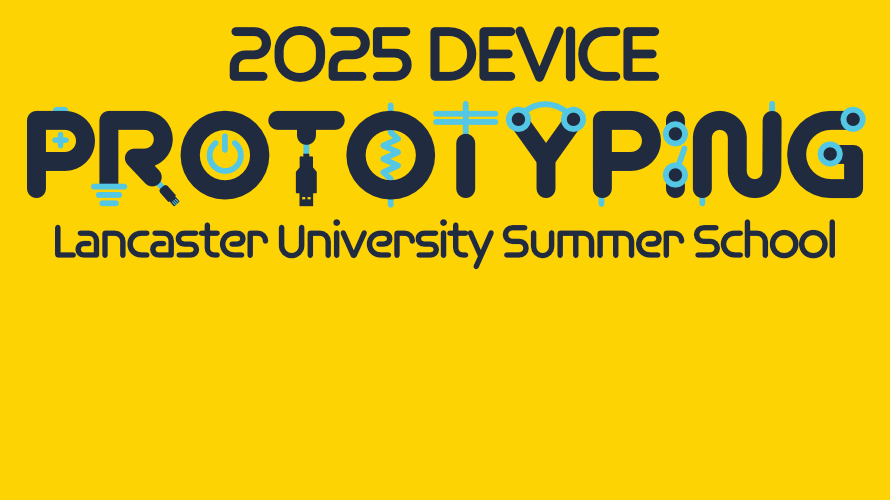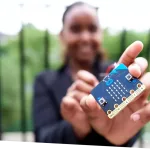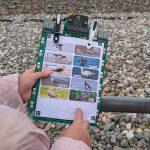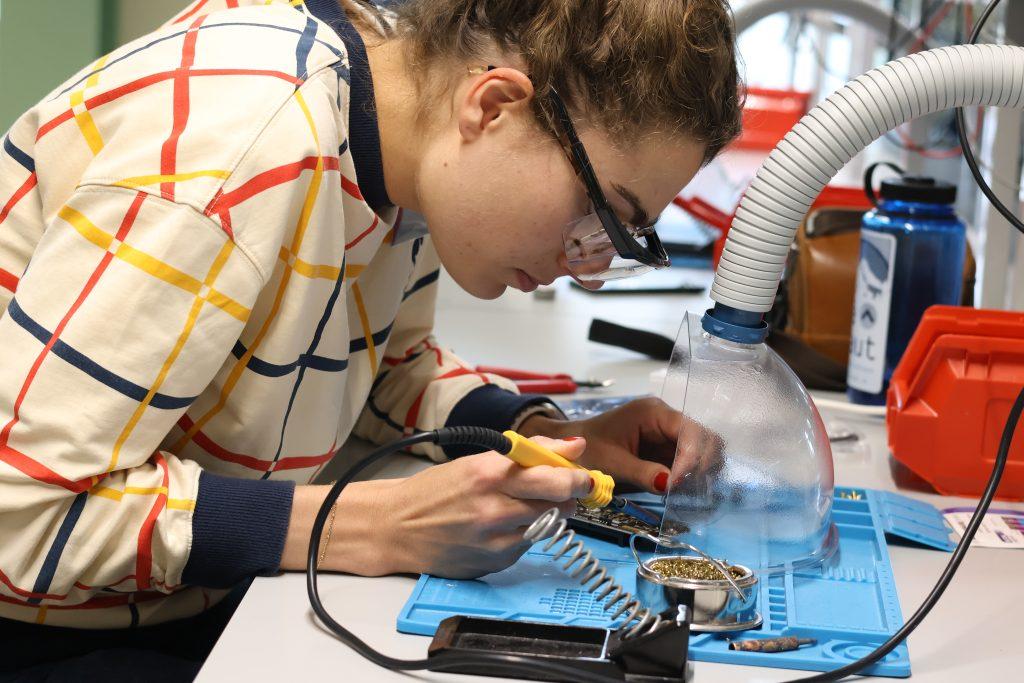Join us for the second annual Device Prototyping Summer School!
Taking place from the 15th to the 18th of July at Lancaster University, this is a great opportunity to learn how to design and replicate digital devices. Attendees will benefit from access to state-of-the-art university labs for hands-on learning as well as instruction from world-leading experts in electronic device production.
⚙️ Ideal for anyone with an interest in low-volume digital device creation including makers, visionaries, and researchers from any discipline.
⚙️ Open to all levels of experience and all career stages – from student to established professional.
⚙️ Up to thirty places available – food, accommodation and all activities covered for just £50!
⚙️ Prizes available to help the most promising prototype ideas move towards production.
Led by Professor Steve Hodges and Dr. Lorraine Underwood, hosted by Lancaster University’s Devices Lab, and supported by the EPSRC-funded pro² network+. The deadline to apply for this event is the 14th of May 2025.
Instructors
 Steve Hodges is an internationally recognised leader in interactive and embedded device creation. He has built and deployed prototypes at all scales, and many of these have transitioned to volume production resulting in millions of devices in market globally.
Steve Hodges is an internationally recognised leader in interactive and embedded device creation. He has built and deployed prototypes at all scales, and many of these have transitioned to volume production resulting in millions of devices in market globally.
 Lorraine Underwood is an internationally published researcher in computer science education, with a particular focus on physical computing. She has built and developed prototypes for teachers and students to use in classrooms around the UK. Lorraine also creates and films personal electronic projects for element14 part of Avnet, the world’s 2nd largest electronic distributor.
Lorraine Underwood is an internationally published researcher in computer science education, with a particular focus on physical computing. She has built and developed prototypes for teachers and students to use in classrooms around the UK. Lorraine also creates and films personal electronic projects for element14 part of Avnet, the world’s 2nd largest electronic distributor.
Examples of devices made in the hundreds, thousands and millions that Steve, Lorraine, and summer school co-founder Professor Joe Finney have worked on include the Active Bat indoor location system, the SenseCam wearable camera, several IoT development boards and modules, the Microsoft Touch Mouse, i-String Lite outdoor lighting, Microsoft Adaptive Accessories, several Jacdac modules and kits, .NET Gadgeteer modules and kits, and the BBC micro:bit.
- The micro:bit pocket-sized computer used by 66 million children worldwide as they learn to code.
- A 5m hummingbird made of the i-String Lite artistic lighting system developed by Joe Finney and Alan Dix.
- Microsoft Adaptive Accessories – d-pad controller.
“From the outset of the three days, the engagement and enthusiasm from the attendees was palpable.”
“We arrived with prototypes and left with a deeper understanding of the intricate process of bringing a product to life.”
Curious about the 2024 Summer School? Check out the highlights, including attendee testimonials, submitted papers, and the winners of last year’s prize competition.
2025 Device Prototyping Summer School
Topics covered include:
⚙️ Mechanical CAD (Computer Aided Design)
⚙️ Debugging opportunities for your own devices
⚙️ Design for manufacture (DfM) and for test (DfT)
⚙️ Surface mount (SMT) assembly
⚙️ Testing and test jigs
⚙️ Regulatory compliance
⚙️ Working with overseas manufacturing partners
⚙️ Demo session
Prizes
Up to £4,000 of prizes are up for grabs! The projects with the most potential for impact, based on the assessment criteria below, will each be awarded either £1,000 or £200 which is to be used to aid prototype development. The summer school organisers will work with awardees after the event to help them spend the money in the most effective way, to suit their prototyping goals.
The full terms and conditions of the competition can be found here.
Number of places
Up to thirty places are available at a cost of £50 each. This is a heavily subsidised rate that covers accommodation, catering for all meals and the content of the summer school itself for the duration of the event. Due to the nature of the subsidisation, the cost will be the same regardless of how much of the event you attend. Places will be awarded based on the quality of your application form, the details of which can be found in the application process section below. In the event that an attendee does not require accommodation, a reduced fee of £25 will be charged.
All attendees must be 18 or over and will have to cover their own travel costs. Attendees from overseas will be responsible for arranging any necessary visas.
Format
The three-and-a-half-day event will be lively and dynamic, leveraging a variety of formats including presentations, demos, hands-on lab-based tutorials, panels and discussions.
The summer school starts Tuesday afternoon 15th July at 1.30pm with registrations open from 11am and runs until 4pm on Friday 18th July. The event includes dinner and socialising on Tuesday, Wednesday, and Thursday evenings.
Application process
Applying to take part is easy! Please complete the application form and submit a short paper (as a Word Document only, no PDFs) to admin@prosquared.org containing a description of your prototype or idea for a prototype along with any pictures, sketches or designs of your prototype by the end of the day, midnight AOE (anywhere on earth) on 14th May 2025. Instructions for writing and submitting the short paper can be found in the application form.
The above short paper template provides an example of what we are looking for. You can also view submitted papers from the 2024 Summer School. We will archive the short papers of successful applicants on the pro² website.
We will accept papers with multiple authors. In this instance, please provide information about each author and their contribution to the work in the bio section. Should your paper be accepted, please note that we may not have capacity to offer places at the summer school to all authors.
Assessment criteria for prizes and sponsored places
The summer school organisers will assess applications based on the content of the application form. Assessment criteria will be based on: well-explained and adventurous but realistic concepts, the impact potential of the ideas, consideration of relevant related work, prior relevant experience of the applicant, and responsible innovation.
Additional Information
Applicants will be notified of the outcome of their application by email.
Further information regarding the accessibility of Lancaster University facilities can be found on the AccessAble website. Please inform of us of any accessibility or dietary requirements in your application form. Quiet spaces and spaces for prayer will be available throughout the event. You can get in touch with us at admin@prosquared.org with any queries you may have.
Financial aid for domestic travel in the UK may be available upon request to those in need. Attendees should first make a request for funding from their own institution before requesting it from the pro² network+.
About pro² and the Devices Lab
pro² is an EPSRC-funded Network+ with the mission to ease the transition from PROtotyping to PROduction for digital devices. pro² is kindly subsidising accommodation and catering costs for up to thirty places!
The Devices Lab at Lancaster University’s School of Computing and Communications works with collaborators from different disciplines and different institutions to design and scale-up electronic devices that help answer all manner of research questions.






